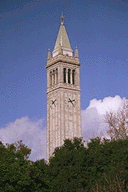 |
AGRICULTURAL &
RESOURCE
ECONOMICS
UNIVERSITY OF CALIFORNIA AT BERKELEY |
 |
EEP 142 - Industrial Organization with Applications to Agriculture and Natural Resources
Spring Semester,
Sofia Villas-Boas
Learning Goals: EEP 142 Industrial Organization with Applications to Agriculture and Natural Resources
Knowledge:
- Attain solid understanding of industrial organization in a variety of markets and implications for welfare.
- Gain an understanding of theoretical literature and how those theoretical insights can be taken to markets, in the form of empirical analyses
- Learn to use Stata to test empirical predictions from theoretical models covered
Skills:
- Develop the ability to interpret and analyze a market structure and industrial organization phenomenon in terms of welfare effects
- Derive policy implications in agricultural and resource markets.
- Begin to acquire independent research skills on a given topic of interest that we cover in the class
- Work in a group to develop a production strategy in a repeated game
-Use Stata to test theories and interpret results
- Learn how to present findings in a class presentation
Quiz is due during lecture 3 of material Problem sets are due on the day announced in the pdf of each pset.
The Midterm is due at the time and date on the front page. It will be emailed to you,
follow instructions in the email you receive from me. No Exceptions! Projects: All cases covered in class are here .
Final Exam is due the latest by the date and time listed in the Exam handout
that will be emailed to you,
follow instructions in the email you receive from me. No Exceptions!
NEW ANNOUNCEMENTS ARE HERE. PLEASE CHECK PERIODICALLY.
Industrial organization is concerned with the workings of markets, in particular, the way firms interact and compete with each other.
This course covers some of the firms strategies that are characteristic
of market interaction: price competition, product differentiation,
price discrimination, predatory pricing, vertical integration, dealer networks
and advertising.
In addition we study the role of public policy in the markets: (1) regulatory laws, such as agricultural price support programs and marketing orders and (2) antitrust or competition policy.
Some of the agricultural and natural resource applications we discuss are: the oil cartel OPEC; the diamonds cartel De Beers and the motives for its policy and reputation for not lowering prices; agricultural cooperatives; predation and acquisition of rivals in tobacco industry; vertical integration of food processors; franchising of fast-food chains; the role of hygiene grade cards in reducing asymmetric information and provision of quality.
Many of the lectures will be theoretical and also applied. The material will be supplemented with discussions of empirical and case studies.
Each student needs to be part of a country group for the OPEC strategy game during this class. Link to Past Class Projects.
Please look at past students impressions on the course: Link
Office hours: Friday. 11-12 or by appointment in room 234 Giannini Hall.
If you wish to put homework in my mailbox it is in room 207 in Giannini Hall.
Textbook: Modern Industrial Organization, Dennis W. Carlton and Jeffrey Perloff, 3rd Edition, Reading, MA: Addison-Wesley, 2000. A copy of this textbook is available in the Moffitt Library. Companion web-page
Optional Reading: Introduction to Industrial Organization, Luis M. B. Cabral, The MIT Press, Cambridge, MA, 2000.
Course Requirements: Problem sets, Quiz, and OPEC game 60% Midterm 15%; Final Exam 25%
Office hours Sofia : Fridays 234 Giannini 11-12
TA's office hours see syllabus provided in first lecture notes
If you need disability-related accommodations in this class, if you have emergency medical information you wish to share with me, or if you need special arrangements in case the building must be evacuated, please inform me immediately. Please see me privately after class or at my office. The Disabled Students' Program (DSP) is the campus office responsible for verifying that students have disability-related needs for academic accommodations and for planning appropriate accommodations, in cooperation with the students themselves and their instructors. Students who need academic accommodations should request them from DSP: 230 Cesar Chavez Student Center, 642-0518 (voice) and 642-6376 (TTY); Webpage http://www.dsp.berkeley.edu/ .
 |
Course Materials |

|
Contact Sofia Villas-Boas |
Back to Homepage , College of Natural Resources Home Page
Copyright 2012-2015 UCB